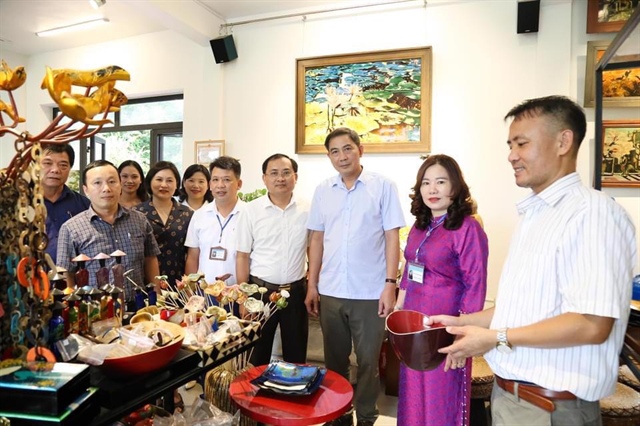Handicrafts: Key to socio-economic growth of Hanoi's district
Handicrafts: Key to socio-economic growth of Hanoi's district
The value of industrial and craft production amounted to VND11.3 trillion (US$456 million) in January-September, up 9.2% year-on-year.
Handicraft production has been a vital force for Hanoi's Thuong Tin District to achieve significant socio-economic recovery and improve the living conditions of locals.

Officials of Thuong Tin District visit a craft business in Duyen Thai Commune. Photo: Nguyen Truong/The Hanoi Times |
Craft production has created jobs for locals, increased their income, and reshaped the district's economic structure, said the Chairman of the People’s Committee of Thuong Tin District, Nguyen Xuan Minh.
Over the past few years, craft villages and craftsmen have made great contributions to the district’s socio-economic growth and new rural development, Minh said.
According to the local authorities, there are a total of 126 craft villages home to 13,000 workshops and hundreds of private businesses that employ 25,000 workers and craftsmen.
The best-known craft hubs in Thuong Tin District include Van Diem Commune with wood production, Van Tao Commune with the ornamental plantation, and Duyen Thai Commune with lacquer painting.
Data from the local authorities show that the district's total industrial production and construction value amounted to VND14.3 trillion (US$576.6 million) in the first nine months of this year, up 5.8% on-year and fulfilled 63.5% of the full-year target.
Of the total, the value of industrial and craft production accounted for VND11.3 trillion, meeting 64.2% of the full-year plan and up 9.2% year on year.
Minh said the results demonstrate the success of a plan adopted by Thuong Tin District in 2018 to foster the development of the craft villages and promote their brands.
Since 2021, Thuong Tin District has undertaken measures for new rural development for ten communes.
With more than 30 years of experience in the production of wood and wooden items, Hoang Ky Tai, a resident of Van Diem commune, has a workshop that spans an area of 2,000 m2.
The products are sold in many provinces and cities across the country, earning up to millions of dollars per year.
Tai currently employs 30 people and pays them an average of VND10 million ($403) per month.
Van Diem commune is another example, it is home to more than 2,200 households, and 70% of them make wooden products. Their contributions represent 70% of the commune's total revenue.
In Noi Thon Village in Van Tao Commune, more than 300 families have been engaged in the ornamental plant trade for years. Commune chairman Nguyen Van Hoan said local farmers supply 10 million ornamental plants for the market every year, earning VND100 million to VND300 million per 360 m2 of plants, much more than in traditional farming.
The ornamental plant trade has also facilitated the growth of collateral jobs, such as pot-making, flower trading, and plant care, Hoan said.
Every year, he added that ornamental planting creates jobs for 70% of the commune's population, providing them with a monthly income of between VND8 million and VND10 million for each person.
Tu Duc Manh, head of the district's economic development division, said authorities had taken steps to help craftsmen develop business and branding plans to improve their market presence.
In 2022, the district has organized 24 training courses and a contest to help artisans improve their skills and strengthen product quality and design according to market demand, Manh said.
The district has also assisted local craftsmen in applying modern technology and methods in production, thus improving the design and quality of outputs.
"Some product brands have been present in China, Europe, and the US. Some 35 artisans have received accolades from the authorities, of which three have been recognized as People's Artisans," Manh added.
Hoa Binh commune chairman Hoang Van Thang said local authorities have encouraged handicraft enterprises to focus on the domestic market and promote products through online platforms amid export difficulties.
In the long term, craft businesses will adopt environmentally friendly methods to boost economic values while promoting local cultural values.
Vice Chairman of the Thuong Tin district People's Committee, Bui Cong Than, said that the district would enhance skill training for local craftsmen, assist local businesses in promoting their existing products and develop branding strategies.





















